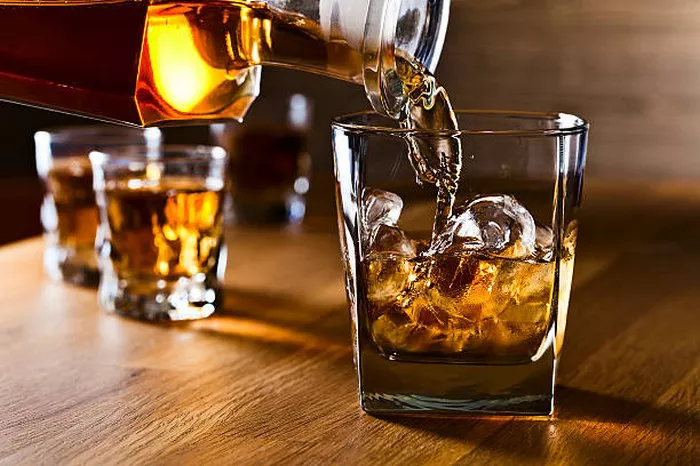Canadian whiskey, often simply referred to as “rye” in Canada, is known for its smooth and approachable character. If you’ve ever wondered what goes into making this iconic Canadian spirit, you’re in the right place. In this article, we’ll delve into the ingredients and production process of Canadian whiskey, shedding light on the elements that contribute to its unique flavor profile.
1. Grains – The Backbone of Canadian Whiskey
Grains are the primary ingredient in Canadian whiskey and play a pivotal role in defining its flavor.
Rye: While the term “rye” is commonly used, not all Canadian whiskeys are made exclusively from rye grains. Some use a high percentage of rye, which imparts a spicier and more robust flavor, while others may use corn or barley as well.
Corn: Corn is often used in the grain bill of Canadian whiskey, contributing to a sweeter and smoother taste. Some Canadian whiskeys are even referred to as “corn whiskey.”
Barley: Barley is another grain occasionally used in the production of Canadian whiskey, providing depth and maltiness to the flavor profile.
2. Water – The Purity of Canadian Whiskey
Water quality is crucial in the production of Canadian whiskey, as it affects both the mashing and dilution processes.
Freshwater Sources: Canadian whiskey distilleries are often located near pristine freshwater sources, ensuring the purity of the water used in production.
Mashing and Fermentation: Water is used in the mashing process to extract sugars from the grains and during fermentation to create alcohol.
3. Distillation – Crafting the Canadian Whiskey Spirit
The distillation process is where the alcohol is separated from the fermented grain mash.
Multiple Distillation: Canadian whiskey is typically distilled multiple times, which results in a cleaner and lighter spirit compared to some other whiskeys.
Column Stills: Many Canadian distilleries use column stills for distillation, a method that emphasizes smoothness and neutrality.
4. Aging – The Influence of Oak Barrels
Aging in oak barrels is a crucial step in the production of Canadian whiskey, shaping its flavor over time.
Oak Barrels: Canadian whiskey must be aged in oak barrels for a minimum of three years, though many are aged longer.
Flavor Development: During aging, the whiskey interacts with the wood, extracting flavors and aromas like vanilla, caramel, and spice from the oak.
Blending: Canadian whiskey is often blended, with master blenders combining various aged barrels to achieve a consistent and harmonious flavor profile.
5. Additional Ingredients – Caramel and Flavorings
While Canadian whiskey is primarily grain-based, some varieties may include additional ingredients.
Caramel: Caramel coloring is occasionally used to achieve a consistent appearance and enhance the whiskey’s visual appeal.
Flavorings: Some Canadian whiskey varieties may incorporate flavorings like fruit extracts or spices to create unique flavor profiles.
Conclusion:
Canadian whiskey is a testament to the artistry of Canadian distillers who have perfected the craft over generations. The blend of grains, pristine water, careful distillation, and oak aging contribute to its smooth and approachable character. Whether you’re sipping it neat, on the rocks, or using it as a base for classic cocktails like the Canadian Manhattan, understanding the ingredients and production process adds depth to your appreciation of this cherished Canadian spirit.
FAQs about Canadian Whiskey :
1. What makes Canadian whiskey unique compared to other types of whiskey?
Canadian whiskey is often noted for its smooth and approachable character. It typically undergoes multiple distillations and is aged in oak barrels, which contribute to its lighter and milder flavor profile compared to some other whiskeys.
2. Can Canadian whiskey be made from 100% rye grains?
Yes, Canadian whiskey can be made from 100% rye grains, and such whiskeys are often referred to as “rye” in Canada. However, not all Canadian whiskeys are exclusively made from rye; some use a blend of grains, including corn and barley.
3. Are there specific regions in Canada known for producing Canadian whiskey?
Canada has several whiskey-producing regions, including Ontario, Quebec, and Alberta. Each region may have its unique styles and traditions, contributing to the diversity of Canadian whiskey.
4. How does the aging process in oak barrels affect the flavor of Canadian whiskey?
Aging in oak barrels imparts flavors and aromas to Canadian whiskey, including vanilla, caramel, and spices. The wood interacts with the spirit over time, resulting in a smoother and more complex taste.
5. Is there an age requirement for Canadian whiskey?
Canadian whiskey must be aged for a minimum of three years in oak barrels to be considered whiskey. Some premium varieties are aged for much longer to achieve a more refined flavor.
6. Are there any legal requirements for labeling Canadian whiskey?
Canadian whiskey labeling is regulated by Canadian law. It must meet specific criteria to be labeled as Canadian whiskey, including the use of grains, distillation, and aging in accordance with Canadian standards.
7. Can you recommend some classic cocktails made with Canadian whiskey?
Certainly! Canadian whiskey is a versatile spirit that works well in a variety of cocktails. Some classics include the Canadian Club Classic 12 Whisky Sour, Canadian Manhattan, and the beloved Whiskey Ginger.
8. What’s the significance of blending in Canadian whiskey production?
Blending is a crucial aspect of Canadian whiskey production. Master blenders combine various aged barrels to achieve consistency in flavor and quality across batches. This practice allows for a well-balanced and harmonious final product.
9. Is Canadian whiskey typically served neat, on the rocks, or in cocktails?
Canadian whiskey is incredibly versatile and can be enjoyed in various ways. Many people enjoy it neat or on the rocks to savor its flavors, while others use it as a base for classic and contemporary cocktails.
10. Are there any Canadian whiskey festivals or events worth attending?
Yes, Canada hosts several whiskey-related events and festivals where you can explore and appreciate Canadian whiskey. The “Whiskey Weekend” in Victoria, British Columbia, and the “Windsor Whiskey Festival” in Ontario are popular examples.


